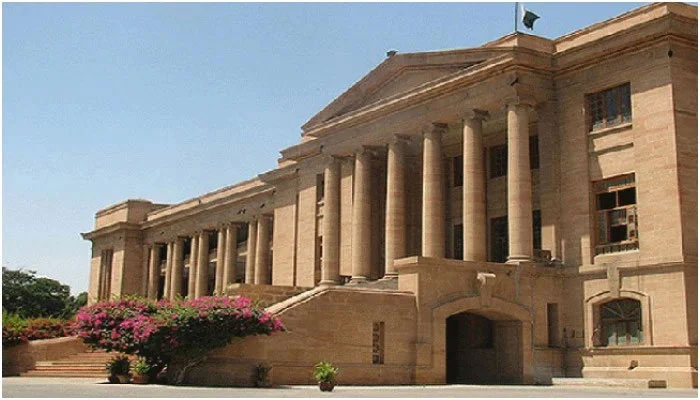Three votes from Sindh Assembly won’t be decisive in presidential election, rules SHC
The Sindh High Court (SHC) on Friday ordered that the residual effect of three votes cast from the Sindh Assembly towards the result of the returning presidential candidate would not be treated as decisive votes till the final outcome of a petition filed by the Sunni Ittehad Council (SIC) against non- allocation of reserved seats of women and minorities to the SIC in the provincial legislature.
The petitioner’s counsel, Ali Tahir, submitted that the petitioner had challenged the order of the Election Commission of Pakistan with regard to dismissal of the SIC’s petition for allocation of proportionate reserved seats for minorities and women in the National and provincial assemblies.
He submitted that the petitioner had also challenged the ECP’s notification with regard to allocation of proportionate reserved seats of minority member and women to the Muttahida Qaumi Movement-Pakistan (MQM-P) and Pakistan People Party Parliamentarians (PPPP).
He submitted that after denial of proportionate seats of minorities and women to the SIC, the three MPA seats were additionally given to the PPPP and MQM-P and their candidates were declared as returned candidates despite the fact that they had already been allocated their due seats as per their proportionate share in the assembly.
A division bench of the high court headed by Justice Zulfiqar Ahmed Khan inquired the petitioner’s counsel about the locus standi and maintainability of the petition after the constitution of the election tribunal. The counsel submitted that the election tribunal under the section 154 of the Elections Act could make only certain limited declaration which were not the prayers sought through the petition.
The counsel submitted that the issue posed through the petition was purely constitutional in nature as the candidature of the returned candidates in the general elections had not been challenged individually through the petition. The high court referred to the Peshawar High Court order in an identical matter to show that minorities and women seats had been distributed amongst various political parties in gratis without making any reference to the applicable law or rules.
Sindh Advocate General (AG) Hassan Akbar waived notice and challenged the maintainability of the petition. The AG submitted that the respondents’ candidates had taken oath as MPA on March 7 and these members had signed the roll of the provincial assembly. He submitted that the respondent MPAs had acquired the rights to cast votes in the upcoming presidential elections which were scheduled to be held on Saturday, March 9, as per the scheme provided in the second schedule of the Constitution.
The high court observed that during the deliberations, it also came to surface that at best if the impugned notifications were set aside, this would effect a small number of votes for the presidential election as per the scheme given under the second schedule of Constitution.
The bench observed that it had also been pointed out that on account of a majority votes of the returned candidates of the political parties, such a small fraction of votes would not make any significance difference.
After the preliminary hearing of the petition, the SHC issued pre-admission notices to the ECP and others and called their comments by March 28.
The high court observed that it would not like to interfere in the actual process of the members of the Sindh Assembly casting their votes for the presidential election scheduled on March 9.
The SHC, however, ordered that the residual effect of three votes cast from the Sindh Assembly towards the result of the returning presidential candidate would not be treated as decisive votes till the final outcome of the petition.
-
 China: Stunning Drone Show Lights Up Night Sky Ahead Of Spring Festival 2026
China: Stunning Drone Show Lights Up Night Sky Ahead Of Spring Festival 2026 -
 Andrew's Epstein Scandal: Will King Charles Abdicate Following King Edward's Footsteps?
Andrew's Epstein Scandal: Will King Charles Abdicate Following King Edward's Footsteps? -
 Billy Joel Leaves Loved Ones Worried With His 'dangerous' Comeback
Billy Joel Leaves Loved Ones Worried With His 'dangerous' Comeback -
 Prince William Dodges Humiliating Question In Saudi Arabia
Prince William Dodges Humiliating Question In Saudi Arabia -
 Dax Shepard Describes 'peaceful' Feeling During Near-fatal Crash
Dax Shepard Describes 'peaceful' Feeling During Near-fatal Crash -
 Steve Martin Says THIS Film Has His Most Funny Scene
Steve Martin Says THIS Film Has His Most Funny Scene -
 Kensington Palace Shares Update As Prince William Continues Saudi Arabia Visit
Kensington Palace Shares Update As Prince William Continues Saudi Arabia Visit -
 Fugitive Crypto Scammer Jailed For 20 Years In $73m Global Fraud
Fugitive Crypto Scammer Jailed For 20 Years In $73m Global Fraud -
 Will Andrew Mountbatten-Windsor Finally Go To Jail Now That King Charles Has Spoken Out? Expert Answers
Will Andrew Mountbatten-Windsor Finally Go To Jail Now That King Charles Has Spoken Out? Expert Answers -
 Melissa McCarthy Reveals Her Tried And Tested ‘corpse’ Night Time Routine That’s Lost Her 95lbs
Melissa McCarthy Reveals Her Tried And Tested ‘corpse’ Night Time Routine That’s Lost Her 95lbs -
 Horrifying Pictures Of The Kidnapper Of Savannah Guthrie's Mother Released
Horrifying Pictures Of The Kidnapper Of Savannah Guthrie's Mother Released -
 Andrew's Ex-girlfriend Launches Brazen Attack On Epstein Victims On Piers Morgan Show
Andrew's Ex-girlfriend Launches Brazen Attack On Epstein Victims On Piers Morgan Show -
 Andrew Mountbatten-Windsor 'on His Own' As Palace Gives Green Light To Law Enforcement
Andrew Mountbatten-Windsor 'on His Own' As Palace Gives Green Light To Law Enforcement -
 Kanye West's Tweet About Super Bowl Halftime Resurfaced After Bad Bunny's Show
Kanye West's Tweet About Super Bowl Halftime Resurfaced After Bad Bunny's Show -
 'FBI' Star Juliana Aidén Martinez Tease Her Return To 'Law And Order: SVU' After Quitting
'FBI' Star Juliana Aidén Martinez Tease Her Return To 'Law And Order: SVU' After Quitting -
 Cardi B's Emotional Words To Pal Amid Stefon Diggs Rumored Breakup Revealed
Cardi B's Emotional Words To Pal Amid Stefon Diggs Rumored Breakup Revealed




